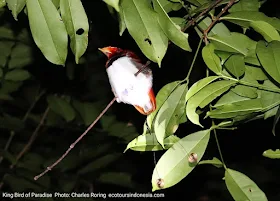As a tourist guide, I often accompany birdwatchers who come from various countries in Europe, America, or Asia. We spend at least 3 days/2 nights up to 2 weeks in the forest to see birds that live in rainforest and coastal areas of West Papua. We walk in the mornings, in the afternoons, and at nights along the trails or roads or beaches.
 |
| Rhett Butler founder of mongabay.com |
We also do night birding to find birds that are active in the dark or that sleep on lower branches of trees. Usually owls, nightjars, frogmouth, boobook, and Hook-billed Kingfishers are the ones that go out to find their prey. We detect their calls and imitate them to attract the birds.
In Mesirrokow river forest, we just walk along the banks of the river to find Large-tailed Nightjar. In Tambrauw Mountains, we walk along empty roads to find Marbled Frogmouth, Hooded Pitta and Azure Kingfisher. In Ases valley of Tambrauw, we saw fruit bats.
 |
| Large-tailed Nightjar |
From my trips with tourists in the jungle, birds that I see sleeping on lower branches include King Bird of Paradise, Red-bellied Pitta, and Spot-winged Monarch.
When we do the night birding, we often see other animals such as cuscus possum, bandicoot, snakes and a lot of insects.
Because taking pictures of animals and plants at night are difficult, we have to use flash of our cameras or light from our torches.
 |
| King Bird of Paradise |
There are venomous snakes in the forest so, birdwatchers must wear boots and socks.
At the moment, the spread of coronavirus has forced government to curb all tourism activities. These birding trips can be continued again in the future if government has lifted the travel ban of foreign tourists. - This is written by Charles Roring
No comments:
Post a Comment